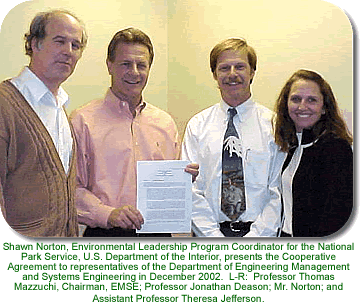In December 2002, the Department of Engineering Management and Systems Engineering entered into a two-year cooperative agreement with the National Park Service (NPS). The goal of the cooperative agreement is to assist the NPS with sustainability education, information dissemination, research and other projects in an effort to make the NPS a national leader in long-term sustainability.
The research and information dissemination activities will be conducted under the leadership of Professor Jonathan P. Deason, Ph.D., P.E. (Lead Professor of the Environmental and Energy Management concentration), and Assistant Professor Theresa Jefferson, D. Sc. (Lead Professor of the Software Engineering and Information Systems Management concentration).
Over the course of the next two years, EMSE graduate students and faculty will undertake a number of projects in conjunction with NPS representatives. These projects are in the areas of: (1) development and application of technology based sustainability tools, (2) web-based communications and networking, and (3) training and education to assist the NPS with its efforts to move toward improved sustainability. These efforts will be addressed toward professional NPS field staff personnel (NPS managers and staff members), other appropriate officials within the Department of the Interior (officials in the Department Secretariat and other Interior bureaus that deal with the NPS), and park professionals at other levels of government (municipal and state park managers and staff members). Further information about each of these three focus areas is provided below:
Technology-Based Sustainability Tools – Park staff need emerging technology-based tools to assist them in implementing sustainable park management solutions. These tools include energy management tools, product life cycle analysis tools and environmental data tracking and analysis tools. EMSE will assist the NPS in identifying appropriate tools and the availability of these through other sources.
Web-Based Communications – Information dissemination is anticipated to be the one of the most important drivers of sustainable park management. As such, EMSE will assist the NPS in developing communication techniques that are web-based and link to critical web-based sustainability references such as the Department of Energy, the Environmental Protection Agency, the Department of Agriculture and others.
Training and Education – Sustainable Park Management is a relatively new field of study with limited curriculum material developed to date. NPS staff personnel need this emerging information to accelerate the implementation of new products and processes.
It is anticipated that the activities undertaken pursuant to the cooperative agreement will address seven operational areas, as summarized below:
· Transportation. This area will focus on the concepts of sustainable transportation modes, fuels and pathways. Specific areas of interest may include renewable and bio-based fuels, community based transportation planning, fleet vehicle infrastructure and management and environmentally preferable roadway and trail-way materials.
· Facilities Design and Construction. This area will focus on the built environment, based on the concept that the built environment should be as unobtrusive and as compatible with the natural environment as possible. Concepts such as efficient energy use, natural landscape management, and low-impact waste management will be included in this thematic area.
· Community Outreach. This area will focus on the park-community interface and the potential for efficiencies of scale in implementing sustainable park management solutions.
· Facilities Operations and Maintenance. This area will focus on the utilization of “small footprint” methods and materials of facility O&M, such as the use of recycled content paper products and citrus-based cleaning solutions. While it is anticipated that efforts undertaken pursuant to the cooperative agreement will assist the NPS with environmental compliance requirements in all environmental media (water, air and waste streams) through the utilization of such techniques as environmental auditing and regulatory education, it also will focus heavily on “moving beyond compliance.” State-of-the-art techniques relevant to moving beyond regulatory compliance, such as the establishment and utilization of environmental management systems and ISO 14000 processes, will be emphasized in the partnership.
· Procurement and Contracting. This area will focus on ensuring that sustainability is practiced beyond park boundaries. Goods and services provided to NPS by others will be examined for their environmental preferability.
· Stewardship Education and Interpretation. This area will focus on imparting an understanding of the attainment of land stewardship through sustainable practices to park visitors. It will include topics such as interactions between humans and their environment (principles of sustainability), how global warming affects land and water resources (evidence of change in national parks), actions that can be taken to reduce drivers and impacts, biodiversity, Native cultures, and other topics.
· Concessions. This area will focus on working with NPS concessioners to provide services to the visiting public that are sustainable. These services are extremely varied and range from horseback riding to hotel management. Best management practices will be investigated and emphasized as a part of this effort.
The direct beneficiaries of the proposed activities will be federal, state and local government officials, and other stakeholders involved in NPS operations. EMSE will provide the results of its efforts to the NPS through papers, educational materials, web sites, informational workshops and other appropriate information delivery mechanisms. Results of the research efforts also will be made available on the Internet through the creation of dedicated World Wide Web home pages with numerous links among interested organizations.


